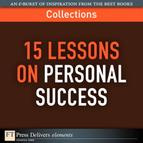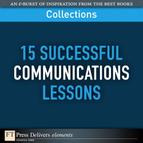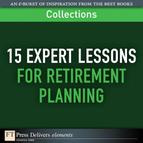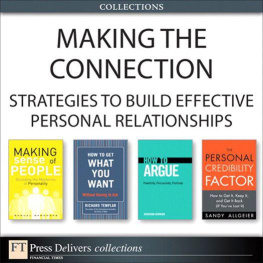15 Lessons on Personal Success (Collection)
FT Press Delivers

Credibility
Ive Lost ItCan I Rebuild It?
Sandy Allgeier
Many of us are familiar with customer service situations that were seriously blown by someone, but the way in which the problem was corrected caused us to think even more positively about the experience than we might have if the problem had not occurred in the first place.
Take, for instance, the example of Elizabeth, a trainer and speaker who travels for her clients around the country to provide seminars that are held in conference hotels. Elizabeth always closes her seminars with a personal story about how she has overcome her tendency to think negatively about difficult circumstances. To illustrate her point, she tells a story about planting corn (positive things) into her mind versus poison (negative things). As a visual reminder, each seminar participant is provided a packet of corn seeds. Recently, during a program at a large New York City hotel, Elizabeth noticed that the staff had not distributed the corn seed packets as expected and she brought it to the attention of the staff. When she returned from lunch, Elizabeth saw small brown paper sacks at each participants seat instead of the corn seed packets. The hotels meeting manager explained that apparently the corn seed packets had been mistakenly thrown out the previous night. When they realized the mistake, a staff member ran to a local market and purchased over 100 paper sacks and packages of microwave popcorn. The staff worked feverishly filling the paper sacks with (pop)corn and then distributed them while the group had lunch. Had the mistake not occurred (throwing away the corn seed packets), the impressive service would not have been so strongly noticed. This same type of opportunity exists for us each time we lose personal credibilityif we respond with positive action to the opportunity!
Rebuilding Is a Process, Not an Event
Two sisters, Carrie and Amy, grew up in a family that struggled in many ways, especially financially. Their father, Joe, had a difficult time staying employed. Joe was a bit of a dreamer, always seeking the next opportunity to make the big timeusually involving some type of get-rich-quick scheme that he tried and that failed. Joes wife, Pam would work full-time during the day as a cafeteria worker in the public school system. Then, after making sure that her daughters had some type of evening meal, she would leave home again, take the bus to another part of town, and work evenings in a retail department store. Meanwhile, Joe generally didnt work.
Because of so many financial pressures, the marriage experienced a great deal of stress. Joe and Pam fought regularly, and, finally, Joe decided to leave his wife and daughters.
Not surprisingly, Joes life didnt improve much after he left. He would move in and out of shelters for the homeless; then, after securing a job and earning a few paychecks, he overextended himself financially with credit. His life was in ongoing chaos. However, his wife and daughters were able to pull together and pull through. Pam eventually was promoted into a buyer position, and, ultimately, became the leader of the organizations buying operations for the region. Carrie and Amy finished school with excellent grades, and both received scholarships to state universities. Each had her own view of her father, and each had some scars from the devastation that comes from being abandoned by a parent.
During one of his many stays at a homeless shelter, Joe met an amazing counselor and social worker, Don. Through many long, soul-searching conversations with Don, Joe began dealing with the many mistakes he had made in his life, and most troubling of all, his abandonment of his daughters and wife. Don helped Joe see that the only way he would regain self-respect was to take the right action with his former family. Nothing positive could happen without his action. And, if nothing else, he would be able to assure himself that he had made an effort.
Joe first contacted his wife, Pam. Pam was very clear that she had no interest in any conversation with Joe. She informed him that because he had been basically missing for more than 12 years that she had obtained a legal divorce. Pam asked that Joe not contact her again and that he not make contact with their daughters.
Joes daughters responded to him in their own ways. The eldest, Carrie, emotionally told Joe that she had no father. Her father had walked out on her family 12 years ago. Joes response was a quiet, I know that you have every right to feel this way. What I did was so wrong. I dont expect you to forgive me.
Amy, the younger daughter, had a slightly different response to Joes contact with her. She was reserved and listened. She only said, I have no idea how I feel about you. Ill have to think about it. Joe left Amy with information on how she could reach him and said he would appreciate any form of contact with her, even if it was an occasional postcard.
For the next three years, Joe continued working on repairing his life. He found a job with an organization that would partially pay for college tuition. He enrolled in school and pursued a degree in psychology. He worked with Don on a volunteer basis at the shelter, hoping to help others in the way Don had helped him. He regularly sent letters to his daughters, updating them on his changed lifestyle, occasionally sending a photograph of him working at the shelter.
On the day Joe received his degree, his daughter Amy showed up for the ceremony. When she found her father after the program, she met him with tears glistening in her eyes. She simply said, Id like to have you in my life. Joe told her that nothing could mean more to him, and he would treasure any opportunity to know his daughter. Over the next year, Amy and Joe became father and daughter, as well as very good friends.
A Simple Statement: You Were Right
Not all losses and rebuilding processes of personal credibility are as dramatic as the one with Joe and his family. Consider Lynn, a young woman who works for a university. Lynn works with Becky. Becky is a long-time employee at the university and can be difficult for her fellow employees to deal with. She is frequently critical, openly challenging their ideas and suggestions when the team meets for departmental meetings. Lynn is very organized and thorough in her work, especially in times of student enrollment. She understands that details can easily slip through the cracks, and that the result of that occurring can be time consuming and expensive for students who might be on the receiving end of the university staffs errors. Becky was openly critical of Lynns approach to an upcoming student orientation, telling her she was spending time and energy unnecessarily, and that no matter how much she planned, there would be mistakes made and there was nothing that could be done.
Thanks to Lynns planning, the orientation went more smoothly than any previous student orientation processes. Becky observed this. And, she did a remarkable thing. She approached Lynn and said, You were right in your approach and planning of this orientation process. It went more smoothly than it ever has. I was really wrong to criticize you. You did a great joband I would like to learn how you put your plan together if you have a chance to teach me sometime. Lynn was absolutely amazed.
I Meant Well, but I Blew It!
Sometimes our mistakes are made out of our best intentions. Still, our personal credibility can be reduced even in those circumstances. With 10 years of previous experience, Barbara assumed a new position as the director of Human Resources with a division of a financial services organization. Barbara did not agree with the methods used by her new organization. The system she was accustomed to established performance reviews and pay increase dates based upon the individual employees original hire dates. For example, if someone was hired in August, that person received a performance review and salary increase in August. As a result of this process, managers conducted employee evaluations and made salary changes throughout the calendar year. In her new company, the performance review process for all employees was conducted in December, at year-end, with all salary increases occurring the first pay period of March of the following year.













